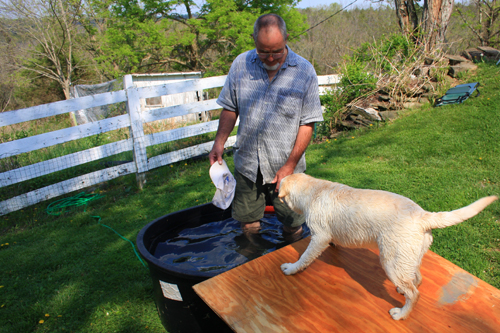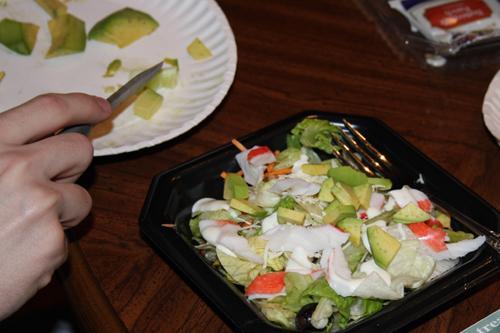June 8, 2010
Must We Go from Short- to Long-Term Environmentalism?
Short-term
environmentalism has been the bane of the green movement since its
start. No one wanted to say it would take ongoing vigilance and
considerable effort to establish a safe environment. Immediate
goals and results were craved and had greater media appeal. From
the start, many of us thought that cleaning up pollution was a
short-lived task. Each of us had the perfect gimmick for what
people (mainly the less enlightened) could do to improve a blighted
environment. It was so simple: expose abuses; list remedies;
publicize results; and pressure the government to do the rest. Only
with time did we see that the multiplication of short-term actions
only solved relatively narrow problems; while in the short-term
river quality was improved, still the global picture seemed to
deteriorate to those who became more sophisticated about
environmental matters and climate change.
Longer-term
environmentalism was not bantered about on that first Earth Day
forty years ago. Such a concept of taking much time and effort was
(and is still) disliked, because few wanted to promote a green
future beyond one's own life span -- and the media appeal was far
less than for short-term solutions performed by enthusiastic
volunteers who wanted to see results right then. What audience will
enthusiastically applaud what seems utterly beyond their expertise
and their realizable goals? Besides longer-term solutions were then
and still are somewhat threatening. For the "trickle down"
economist, wealth, comfort and progress are just around the corner.
And today over a billion new middle class Asians and Latin Americans
strive for the same material comforts of Europeans and Americans,
and at a massive additional price of resource expenditure and
resulting pollution. Tweaking the system with regulations and
conservation measures will not be sufficient.
Environmental response
is more varied today than at Earth Day, 1970. Some rush on to
acquire middle class comforts: cars, processed food, electronic
devices and deny any problems -- "Live for the day." Other admit
problems but stay in the short-term ruts. Others say "Leave it to
the experts." However, the stark reality makes astute observers
voice a new environmental message:
WE MUST CHANGE THE WORLD
ECONOMIC SYSTEM, IF WE ARE TO SAVE OUR PLANET. WE CANNOT HAVE A
PEACEFUL WORLD OF HAVES AND HAVE-NOTS.
Not being expected to
live to see long-term results is similar to planting trees and
realizing that benefits (shade, fruit, nuts, etc.) will occur after
we are gone. The longer-term message is an environmentally
prophetic one and this cries out for a hearing. Short-term
solutions prove we can act, and solve some immediate problems. Yes,
longer-term solutions are called for and are humanly possible. But
we must act now and trust results can be achieved. We must act
justly for the benefit of all.
Prayer: Lord,
give me the courage to speak in the longer term and to invite
short-term green advocates to do the same. Help us see that our
efforts must be geared for a just and peaceful future.

Pets keep us young at heart...
Teaching a puppy to swim on a warm day in late spring.
(*photo credit)
June 9, 2010 How Many
Ways Are There to Age Gracefully?
On Senior
Citizens Day it is proper to consider the learning associated
with aging. I have met people over the years who were graceful in
welcoming older age; others kick and fight the inevitable process
of aging and want to forget their birthdays -- that seem to come
more rapidly with years. Why not ride with the tide? What do you
think of these ways to grace advanced years?
1. Refuse to
retire. Rather increase personal services as a benefit for
others as well as for personal enrichment, for ultimately even this
enrichment may work to the benefit of others. Retiring could mean
switching to less stressful work that is more in keeping with
limited energy levels.
2. Rise
early and have much to engage yourself whether essential to the
welfare of others or hobbies and practices for your own enjoyment --
ultimately for others. Those of us who rise early get more done --
though we may be overly busy at times. Thus this suggestion comes
with a caution: let's pace ourselves.
3. Exercise
regularly. Young children need safe outdoor space away from
congestion and well-policed; older people need outdoor
opportunities for fresh air and exercise as well, even if the
stretching of all muscles is done in a seated position.
4. Eat
healthful food is heard from childhood on, but for many of us it
needs to be a daily flashing sign. We may be tempted to cut short
on nutritious food and follow the fast food signs to burgers and
fries, sugar and salt. Keep veggies, fruit and whole grains in mind
and learn to create a new dish each day.
5. Care for
plants either in a garden or on a window sill. All of us should
take charge of encouraging life in some form each day. Some have
more energy and can fill outdoor space with herbs and vegetables;
others may find indoor plants enough and satisfying in all their
beauty and vigor.
6. Learn
something new every day and keep the mind active. Look for new
intellectual challenges that can both be enriching and assist in
giving service to our neighbors.
7. Mentor the
young and keep in touch with old friends who are also seeking to
age gracefully. Pass on the tips that work for you in an acceptable
manner for both the young and the old. Seniors are supposed to give
wise advice, and know when to keep silent and simply allow others to
do their thing.
8. Be
hopeful about the future, for we can be the heralds for those
who are tempted to give up. That includes our prayer life being
such that we remember those who are in need whether they ask for
help or not.
Prayer:
Help us, Lord, to age with enthusiasm and humor.

Eastern box turtle makes a trail through the grass.
(*photo credit)
June 10, 2010
Natural Gas: A Bright Future?
In a world of
rapidly shifting energy sources, much attention is given to the rise
of wind power as a renewable energy source. However, the message is
more complex; some non-renewables must act as transition fuels on
the road to a more sustainable energy use pattern. We cannot afford
to overlook the rapidly increasing ability to get locked natural gas
from shale formations by some new technological innovation of
horizonal drilling deep underground called "fracking." This energy
source is quite widespread with over half of our states and parts of
Canada having available sources. North America with 230 trillion
cubic meters ranks second to Asia-Pacific with 270 trillion in total
gas reserves of shale gas, tight gas and coal bed gas; the former
Soviet Union is third with about 150 trillion with other parts of
the globe having smaller amounts. Natural gas prices have more than
halved in the last two years; here energy independence has been
achieved with little prospect of need for imported liquid natural
gas (LNG).
This cleaner
non-renewable energy source, occurring while reserves of petroleum
are slumping, was not anticipated even a few years ago. Plentiful
natural gas bodes well for two of the three major uses of fuel,
namely domestic cooking/heating and powerplant electricity
generation; it is more problematic for the third, the transportation
sector. However, even in the travel arena liquefied natural gas
could be used in trucking, if a refill network were established and
if electricity-recharged passenger cars were more commercially
available.
One advantage
of plentiful natural gas is that it can be extracted with less
disturbance than coal -- though natural gas production does have
problems associated with extraction. Natural gas can be piped or
transported more easily than other fossil fuels; natural gas has
only half the carbon emissions of coal per unit of energy produced
and thus can easily replace coal-fired power plants. Certainly
natural gas does not have the disposal and safety problems of spent
nuclear fuel. A major advantage is that gas is more easily able to
operate in tandem with solar and wind renewable systems when they
are unable to produce sufficient power. Some estimate that at
present use patterns this fossil fuel could last at least one
hundred years ("An Unconventional Glut," The Economist,
March 13, 2010, pp. 72-74).
However, not
all natural gas prospects are rosy. First, this is a fossil fuel
and, while it replaces dirty and cheap coal, its consumption adds to
the carbon footprint that exacerbates climate change problems.
Second, this fuel could become so plentiful and desirable that it
will hamper the current rapid growth of renewable wind, geothermal
and solar energy use. Last of all, removal of shale gas could
disturb some valuable aquifers; unforeseen technical problems may
surface.
Prayer:
Lord, give us the insight to be realistic in stewarding the
seemingly plentiful resources of our planet.

Columbine flower for late spring color.
(*photo credit)
June 11, 2010
Global Atmospheric Methane: A Problem?
Methane (CH4),
the major component of plentiful natural gas just discussed, is the
product of certain decomposition and, when emitted into the
atmosphere, can be a greenhouse "pollutant" with many times the
potency of better-known carbon dioxide. Capturing and using this
gas as a fuel is, as discussed yesterday, highly desirable due to
its combustibility, ease of extraction and total released energy per
unit measurement. Widespread use of methane today makes for its
handling in a relatively safe manner. However, we do hear of
occasional explosions or unvented mine methane buildup and resulting
loss of life.
Apart from the
rapidly increasing availability of natural gas on a worldwide level,
methane is worrisome when it enters the atmosphere and cannot be
collected feasibly for combustion. It is a waste gas from
landfills, but this methane can be utilized as a commercial fuel in
many instances. Animal wastes generate methane provided the
materials are concentrated in a space (unfortunately an ecologically
polluting feedlot) where the gas can theoretically be collected.
Because livestock can become a global source of one-quarter of the
generated atmospheric methane, environmental experts call for fewer
livestock, not more congregated feedlots.
However another
potential atmospheric methane source is regarded as a "time bomb,"
namely melting permafrost in Arctic regions due to global warming.
Arctic emissions of methane have jumped about thirty percent in
recent years. We are speaking of millions of tons of methane going
into the atmosphere. The long Russian Arctic coast emits 7.7
million tons per year and total global methane emissions amount to
500 teragrams a year. Atmospheric methane concentrations over this
Arctic area are three times the global average of 0.6-0.7 parts per
million. Some climate scientists think that past catastrophic
effects leading to sudden warming were caused by cascading emissions
of more and more methane. The Arctic Ocean methane store could be
greater than all the carbon locked in global coal reserves; unit for
unit, methane traps about twenty-five times as much heat as does
carbon dioxide.
As noted,
methane is part of the natural cycles of our world. However, at
certain places and in concentrated amounts methane is a big
problem. Like all chemicals, we must respect methane through proper
management. Unfortunately, a scientific consensus is emerging that
human practices result in excessive carbon dioxide and the long-term
results of this can lead to excessive emissions of methane through
the release of Arctic methane. There is no easy gimmick or easy
technological fix beyond burning excess methane as a fuel.
Controlled, methane is a benefit; uncontrolled atmospheric methane
is a disaster.
Prayer:
Lord, teach us to respect all chemicals, to use them carefully, and
to realize how delicate is this planet's web of life.

Reflections of a blue sky in a puddle of rainwater.
(*photo credit)
June 12,
2010 Rainwater Barrels Anyone?
Rainwater
barrels are containers that hold some of the water collected when
showers or rains occur, and allow for a good source of untreated
water for use on garden produce and flowers during times of water
scarcity. While these containers are smaller than cisterns, they
can save precious water for domestic use (watering plants and pets
and washing cars and soft water for washing hair). Other advantages
include:
* They are a
non-chlorinated source of water for garden plants -- and chlorinated
products are harmful to some plants;
* They do not have the high salt or iron content, or other
chemical contamination often present in groundwater;
* They can
provide high quality water, which is near-at-hand;
* They are
under sole control of the homeowner;
* They do not
require water treatment for anticipated uses;
* They are
inexpensive to maintain and reduce water bills;
* They allow
small rain showers during droughts to be conveniently collected;
and
* They remind us
often of the need to conserve water.
Regular barrels are available
in most areas, for they are used for a variety of commodities and
can be purchased at different prices depending on availability.
Some prefer a specific barrel with an outlet spigot to release water
when needed. Choose a clean barrel that has not contained
chemicals. Plastic may be better than metal, for metal will
rupture, if filled with water in winter and the contents allowed to
freeze. Even the metal barrels can be protected by inserting a
chunk of styrofoam that will allow ice that might form to expand
against the foam rather than the barrel walls. Many people simply
empty the barrels in winter -- and that is better maintenance.
Some may want a larger water
store and thus think of a larger fiberglass water tank of hundreds
of gallons or a cistern. However, the 50-plus-gallon water barrel
will be sufficient to carry one through less severe drought
periods. Often people would prefer one barrel at each side of the
house rather than running guttering from both sides to one barrel.
The downspout can be equipped with a cut-out that is always left in
an "off" position except in a heavy rain, and after an immediate
cleaning period by the early rainwater. This will save having to
install filters so that the barrel does not collect debris.
Elaborately painted rain barrels can be expensive, but they allow
budding artists opportunities to show off their skills; the painted
barrel is good promotion to get neighbors to consider water
conservation measures. The decoration of the barrel could be a
youth community project.
Prayer: Lord, help us
to see that water is a precious commodity that must always be
treated with respect; give us the creativity to find ways of doing
this and utilizing good water for our garden needs.

Ozark milkweed, Asclepias viridis.
(*photo credit)
June 13, 2010 Can We Live
the Trinity Mystery?
We are to make each truth in
which we believe more than words; they must become deeds. The
major challenge on the feast of the Holy Trinity is how to
take this deep mystery of faith and translate it in ways that allow
all to see that our faith motivates and inspires our living deeds in
special ways.
Let us expand on the thoughts
of last Sunday's Feast of Corpus Christi. In the Liturgy,
the work of the people, we are present when Christ is re-presented
to the people, when Calvary is extended in space and time. Through
words of consecration we witness to a sacred act of Christ coming
among us in a personal way. We have Jesus present as we go out from
the event and strive to live his presence in our word and deed. We
become Christ to others.
Looking to the historical Jesus
we see through reflection on the Scriptures that he is the
embodiment of the Trinity's creativity, proclamation and extending
love. In Jesus' life, death, and resurrection we find the human
face of the Trinity. Now we return from this faith acknowledgment
as to who we are as we journey through life. We too are part of the
Body of Christ, the embodiment of the Trinity mystery in our actions
when in conformity with the Lord. We are other christs and, as the
intensity of our loving service to others grows, we increasingly
show the truths in which we believe.
The Trinitarian nature of our
Christian actions is shown in various ways. For one, we have
creative ideas about what we must do; we think over these and
articulate and interact with others about them; we resolve and put
these words into action as service with and for others -- and we do
this in the infinite sea of God's love for us, namely in gratitude
for having been called to do such work. A procession of moments in
our Christian action occurs: we are grateful for our gifts given by
the Creator; we reflect on how to go about our actions; we take on
some degree of service out of love of our neighbor.
All that we are and do imitates
the Trinity in some way, but any act of love and sharing with others
shows that character all the more. When our actions are done in
unity with the entire Body of Christ the oneness of the Three Divine
Persons is all the more apparent. Our cooperative efforts at being
of service and the desire to grow in these efforts, bring us deeper
into the reality of God's working in us. Through service and the
desire to continue and be persistent in our cooperative service we
show in action the Trinity who permeates our lives -- and the
greater the degree of love we put into each act, the greater is our
witness to the God who is Love..
Prayer: O God of love,
teach us to enter fully into salvation history and become a
revelation of your love through the actions we perform.

American flag in the morning light.
(*photo credit)
June 14, 2010 Treat Old
Glory with Respect
The final ceremony at veterans'
funerals just before committing the body to the grave involves the
honor guard, the taps, the rifle reports, the folding of the flag
covering the coffin and the military salute to survivors. The care
with which the flag is folded into that triangle shape to be placed
in a prominent place by the spouse is always a moment of the deepest
respect for the deceased.
Flags have been used since time
immemorial to symbolize the devotion, courage and commitment of
those who have given public service and were willing to sacrifice
themselves for others. The flag stands for those noble efforts.
People marched together behind a flag; some took great pains in the
midst of war to raise a flag, as at Iwo Jima; some risked their
lives to make sure the flag did not fall to the ground. Respect for
fellow citizens and those who sacrificed their lives is all in a
flag.
We ought to teach respect for
the flag especially to a more informal generation who may be
inclined to take symbols lightly. As we age we may become more
rigid in what is proper respect: undivided attention, silence,
salutes, hand-to-breast, standing at the National Anthem. We fly
flags at half-mast when an important person dies. We recall, in the
words of the Star Spangled Banner, the immense uplift in
spirits when they noticed over Fort McHenry near Baltimore that the
flag had survived the British bombardment. Our national
consciousness is expressed through the symbol of our flag even while
the emblems of states and communities do not elicit such pent-up
emotion.
On Flag Day we even appreciate
that some fly their flags at their places of business or at home.
Today, our flags fly day and night, though the flag is supposed to
be a lit symbol and is not supposed to be flown in darkness.
Respect requires certain practices as to how to handle, fold and
even destroy damaged flags. Disrespect of any sort bothers us most
of the time -- for proper respect is a delicate boundary that can be
easily crossed. We may wince when goofy folks drape themselves in
our flag in improper ways; however, we applaud when American
Olympic winners do just that on receiving their well-deserved
medals.
We have been living a half
century with a flag of fifty states and hardly recall except in
reading history books that the American flag changed in number of
stars many times during the history of the expanding republic.
However many stars, the American flag still elicits strong emotion
on the part of many service personnel. The pledge of allegiance,
given daily by students, indicates that we have a common heritage
worth respecting on this and every annual Flag Day.
Prayer: Lord
help us extend this act of respect to our national symbol, the flag,
so that we are better bonded.

The gentle glow of sunset.
(*photo credit)
June 15, 2010 How about
Some Verses: Steadfastness?
STEADFASTNESS
We strive
to stand firm,
not moved
by shifting winds,
or
rushing tides, or darkened skies.
We affirm
the Faithful One
Who gives
us steadfast love
with
gifts that eternalize.
That
divine faithful love
takes
root in Earth herself
where
sufferers personalize.
We too give
another our word,
steadfast
promise unwritten
through voices that legalize.
Let us the
restless ones
speak in
a mountain way,
on our
word we solemnize.
In changing times we are more
aware that the individual must stand up to the storm and show a
fearless behavior, always aware of the current situation. Being
alert people, we must constantly glance out to the horizon wherein
our hope lies. The current situation allows us to care for the ones
near us, our family and local community; a steady gaze shows that
we are not completely taken up with the present moment, but we
direct our journey to the distant goal that is beyond our immediate
vicinity.
We are thus committed to learn
from our surroundings and to gather the faithful courage it takes to
continue moving, even when feet and body ache. Furthermore, we are
committed to forming larger and expanding communities that reach
beyond our immediate purview; we look out to those neighbors beyond
the locality. However, this steadfast search beyond involves a
trust based on a covenant promise. Fidelity includes giving care to
the needy, and ensuring that those who come after us follow in our
footsteps as caring service people to their peers as well. In this
age of short-term agreements some presume their marriages will not
last and make financial arrangements in case of eventual breakup.
The lack of long-term goals extends to home purchases, jobs,
religious practice, even friendships. Mobility has a place but so
do stability and steadfastness.
Photos of mountain scenes that
reflect the world of land forms that can teach us steadfastness are
found in Mountain Moments -- soon to be released. Other
characteristics of mountains are also featured in this coffee table
book from our publisher, Acclaim Press. See the home page of the
website for purchase details.
Prayer: Lord in your
steadfast love for us teach us to be steadfast in what we do and the
way we treat others.

A pause to enjoy a fresh lilac bloom.
(*photo credit)
June 16, 2010 Do You
Know the Ten Commandments of Capitalism?
Michael Moore's recent movie,
Capitalism: A Love Affair can be regarded as a subject for
deeper reflection. Amid its humor is far deeper subject matter.
Where is our heart when it comes to our current economic system?
Recently when Senator Dodd was presenting his revised plan for
reforming this country's financial system, he admitted that the
system is vulnerable to collapse. What he omitted was whether the
entire system is rotten and needs replacement. It is as though the
assumption must be made that we are married to capitalism or regard
it as a state religion. If that is our problem, we need to ask the
basic question of believers -- do we follow the Commandments of a
Godless system that takes the place of supernatural faith?
Ten
Commandments
1. I am the lord thy god, and
money is my name. You shall not allow anyone else to question this
economic system and shall have no personal or strange gods before
you.
2. You shall not question or
speak ill of my priestly bankers who conduct services in the temple
of Wall Street. Always treat the use of private money with the
deepest respect.
3. Remember to work hard for
money and thus keep holy the day of financial comfort.
4. Honor your fatherland that
is totally committed to the money economy and fight and even die for
it.
5. You shall not kill the
spirit of greed or confront those who have privileges, for some day
you may (after the lotto win) be one of them.
6. You shall not rape the
coffers of the rich by any form of taxation that will destroy their
noble privilege. Keep taxes for everyone, for all taxpayers must
exercise their civic duty and support the system.
7. You should regard the
taking of private wealth for the common good as a form of stealing
from those who have recognized wealth through established legal
means.
8. Do not bear false witness
against the capitalistic system, nor against the sacred person of
corporations.
9. You shall not covet the
possessions of the greedy and the bankers; only covet their good
life. If you are good and lucky, wealth will trickle down to you.
10. You shall not covet the
luxuries of the rich; you may some day have the privileges as well.
Prayer: Lord, relieve
us from all our foolishness.

Oxeye daisy, Leucanthemum vulgare.
(*photo by Sally Ramsdell)
June 17, 2010 Is the Right to
Health Access a Global Concern?
A person's right to access to proper health
care has been the subject of debate in this country for over a year, and recent
legislation efforts have only increased the debate itself. Costs of extending
this care to everyone in this nation have been a major consideration. Most are
willing to admit that advances in health are meant to benefit all our human
family, but a fair and just method of extending these benefits has yet to be
fully settled even with recent legislation. Private insurance companies have
been highly profitable and reining them in with all their political clout has
become a major contentious issue.
Public funds have
been used for scientific research and training of personnel as well as for the
safety, prevention, and maintenance agencies that have promoted health
advances. Unfortunately, a substantial portion of public funds has been used to
subsidize the private pharmaceutical industry that advertises their wares in the
public media -- and this leads to what some call a fifty billion dollar
overcharge (John Abramson, Overdosed America: The Broken Promise of American
Medicine [2004]). This nation, even with an expanded right to health, is
still caught up in a drug-related problem that results in overdosing and
excessive drug use, even when legal.
So much attention has been given to health
care within our nation that we often fail to see that we have global commitments
to our brothers and sisters in other countries. Perhaps two billion of the
world's people just hope for the barest medical essentials such as access to
clinics, medicines and vaccines. In one-third of the world's lands, health
systems are lacking or exist in the most rudimentary manner, while a majority of
the nations' health care workers migrate to richer lands. The shortage of
health care personnel is a chronic global problem.
A global health
protection program includes current medical information, proper medicines,
general public health services, and access to basic immunization programs and
protective equipment such as bed netting in malaria-prone areas of the world.
Medical care based on economics allows the richer parts of the world to receive
the most care and the poorer ones the least. If health care is to be rationed,
what must be the selection basis? If according to need -- but whose need? On
what basis should medical research funds be apportioned? On the most dangerous
threats to more people? On the drug that is potentially most profitable? On
tropical diseases afflicting the poor? Perhaps in no area is the divide between
the rich and poor more felt than in medical access and distribution of proper
medicines. Amid rising health care costs the health of the world's people must
always be considered.
Prayer:
God of the poor, help us to see and hear the ones who are calling for help --
for we are all one family. Would that we were as concerned about each other's
health!

Miami mist, Phacelia purshii.
(*photo credit)
June 18, 2010 Can Our
Nation Create a Proper Energy Mix?
In this period of rapid energy demand and
growing awareness of carbon dioxide and air pollutants from powerplants and
vehicles, we seek an energy mix that will satisfy essential global needs. Not
every state in our country is blessed with equal amounts of renewable energy as
the government's map of "Annual Direct Normal Solar Radiation" or "Wind Power
Classification" will show. Though small amounts of available wind and solar
energy are found throughout our country, there are optimal areas of more rapid
payback. We consider mixes of various energy amounts in order to tide us over
until we reach a sound balance in a few decades down the road.
Energy
efficiency techniques and education should be directed especially to those
parts of our land that are less gifted with solar, wind and geothermal energy.
Such places exist as here in Kentucky, where more focus must be placed on energy
conservation. In the past our state has benefited from plentiful cheap coal and
thus has fallen behind in energy efficiency. In fact, if such conservation
programs were promoted, savings would equal increased energy demand for the
foreseeable future. More insulation and efficient light bulbs await
installation. A cap on emissions could hasten the day of energy efficiency.
Grid
integration will allow the flow of electricity, wind-generated on the High
Plains or in many coastal areas, to be shared with people in outlying and less
wind-rich regions.
Hydropower
is clean and can be obtained to some degree from water currents and tides
without the need for more disturbing dams in the waterways.
Geothermal
energy is most available for centralized electricity generation in many
western states. However, geothermal heat from heat pumps is widely available.
It uses ground and atmospheric temperature differentials for heating and cooling
and has produced reductions in domestic heating and cooling bills of up to 70%.
Equipment does wear out and needs replacement about every fifteen years.
Biofuels
are of great variety and include waste materials used as fuels. However, not
all biofuels are equal. We ought never to use food grains for fuel when such
use must be highly subsidized (over four dollars per gallon for
currently-produced ethanol for auto use) and results in higher-priced foods.
Non-renewable
sources are currently in our energy mix: natural gas has a bright future; coal
ought to be phased out, for so-called clean coal technologies are expensive; new
nuclear power plants should be avoided due to costs and safety issues.
Prayer: Lord, give us the strength to
choose wisely from the many gifts given -- and to be less wasteful in our
actions.

Black orange butterfly on dogbane, Apocynum
cannabinum.
(*photo by Sally Ramsdell)
June 19, 2010 Do We
Pretend We Have Sufficient Resources?
When younger we
would engage in a game -- how close can we come to the end of the auto gas tank
before going for more fuel. I don't think such risk-taking appeals to older
folks who have to tote a fuel can several miles to the nearest gas station, but
we engage in equivalent sorts of games. How close can we come in our wasteful
practice of using gasoline-powered vehicles before we find out the emperor has
no oil? Some within the International Energy Agency (IEA) believe that the
world's major oil consumers are downplaying the looming crisis among a public
that simply does not want to hear bad news. Oil is running out.
Consumption is
still rising. Predictions are being hedged by not only oil companies but
the IEA itself. The brief dip in our global energy use during the recent "Great
Recession" is soon to be history. While we feel as a nation somewhat more
relaxed because one-quarter of our corn crop is going to substitute ethanol in
our fuel tanks, and we are using more efficient vehicles, still current comfort
is short-lived. America is no longer the number one car buyer; China is. If
we blink we may even get surpassed by India with its massive small car market.
Unfortunately, these emerging Asian consumers are looking desperately for
petroleum sources -- and are willing to pay top dollar for more supplies in
Sudan, Iran, Iraq and other remaining oil reserves.
The problem is
growing. In the future petroleum resources may be sufficient for legitimate
needs but not for the wants of the greedy. For instance, additional comfort
comes with each new discovery of an oil field, especially under the vast oceans
off Brazil, the Falkland Islands, and south China/Philippines. However, the
total predicted from these fields (or new American coastal or Alaskan oil
fields) is simply not enough to meet demands for more than one or so additional
years at current rates of about 83 million barrels of oil production per day. A
few years back the IEA spoke of 130 million barrels production per day. Even
the much lower 110 million barrels of five years ago dropped to 105 million in
2008 -- and that is optimistic. By comparing existing oil reserves and
considering that 30 billion barrels of oil are consumed per year, we see that
new discoveries in Africa (and anticipated Iraq's increased production above
current two million barrels per day) will not suffice.
Tell it as it
is, even if risky. We constantly advocate the use of less energy through
conservation and promote those sources that are less harmful to the
environment. Telling it means that we ought to save the limited non-renewable
petroleum resources to meet future needs -- even when potential supplies of
natural gas grow. Is publicizing coming oil shortages going to hasten the day
of four dollars per gallon gasoline -- and richer nations scrambling to ensure
supply sources?
Prayer:
Teach us Lord to be realistic in use of resources.

Assorted colors of a June lawn in Kentucky.
(*photo credit)
June 20, 2010 Fatherly Self-Sacrifice
If anyone wishes to come after me, he
will deny himself
and take up his cross daily and follow
me. (Luke 9:21-22)
Father's Day
and the prescribed Sunday liturgical readings sometimes have a happy junction --
and so it is today on the Twelfth Sunday in Ordinary time. The Messiah is to
undergo suffering as Messiah, and we are invited as followers to do the same.
That invitation includes our life's journeys, vows, circumstances, and joint
ventures such as raising families or improving communities. For better or
worse, our crosses are associated with responsibilities in life.
We do not have to seek out sufferings; they
are there for the taking and include accepting life's challenges and the
opportunity to grow in such an acceptance. e.g., fatherhood. A conscientious
father, today's focus, accepts his crosses connected to providing, caring for,
supporting and creating a viable family in a world where self-centeredness is an
accepted norm. The cross of fatherhood includes accepting responsibility for
children, lost sleep and privacy, uncertainty about future livelihood, and
concerns about health of offspring as well as of spouse, parents and close
relatives. Sufferings occur provided we do not deny them, excuse ourselves from
them, or seek to escape to other more comfortable pursuits.
Over time,
fathers learn to be truly paternal and caring while avoiding being paternalistic
and domineering. A challenge! Some fathers do this better than others.
Failure comes when caring breaks down through self-allurements, substance abuse
or infidelity. Success comes through hard work and constant vigilance over
one's household. Sacrifice means denying oneself and avoiding the temptations
that would otherwise make us selfish and inwardly focused. Paternal challenges
include helping launch youngsters on the right road to life, but also giving
them the freedom to accept responsibility and judge correctly. It includes
treating each person according to personality and needs.
Self-sacrifice involves understanding one's
powerlessness found in carrying a cross. However in accepting a cross we
discover a hidden power -- a spirituality rooted in self-surrender and also
self-discovery -- a process that Soren Kierkegaard addresses in The Sickness
unto Death. Fathers who give themselves up for others, and are willing to
do so, actually find themselves as companions with the Lord. Quality time spent
with family becomes a spiritual investment in which a peace and satisfaction
endures -- and helps improve performance. The person willing to become a
suffering servant for others becomes a companion and friend even though this may
involve "tough love" directed to the betterment of children.
Prayer: Lord, help us to be companions
and friends to those under our charge, much as you are father to us.

A rolled bale of Kentucky hay in June.
(*photo credit)
June 21, 2010 Must We Make Hay While
the Sun Shines?
Hay-making is
part of agricultural operations at this time of year in our northern
hemisphere; this occurs around the summer solstice, the longest day of the
year. Weather has an important role as well, for suitable time is at a premium
for curing and baling hay without loss of its higher nutritional value. Too
much moisture in the hay results in moldy product, and too much drying is
detrimental as well. The opportune moment must be seized and made good.
After this
solstice, the longest day, it is downhill for sunlight span starting
tomorrow. The sunshine of our lives is also of limited duration. Unlike the
winter solstice, when we know each day will be longer for the next six months,
we now sense the shortening of daylight as starting to occur very soon. Thus
doing the best with a limited span is more relevant to us now on the longest day
-- at least that is the way I see it.
Others may not take this rather realistic view on
June 21, when each of the next six months is a little more dying; is this
because not all of us are "day people" who value sunlight more than growing
darkness?
I was never a
great "haymaker." In fact, I note that none of my 1,633 previous essays deal
with this practice as such. Hay-making is sweaty, difficult and dirty, even
though the benefits are great for the wintered livestock. Perhaps the practice
today with more mechanized equipment may be seen by modern haymakers as less
onerous, for our haying consisted of putting the crop into a barn that was
itself a hot box in summer. However, even amid the summer work, there was a
bright horizon. Hay-making looked ahead to a comfortable winter hayloft and
hungry cattle straining to be fed. Hay-making was then and is now a longer-term
investment, and what we sacrifice in harvesting yields a payoff later. Thus
farmers take this investment and accept the sacrifices involved -- and on the
open market hay proves to be a good commodity and brings a good price.
Looking beyond
hay as a commodity we see that investing in our future prospects involves making
some effort now. Our investment in assisting others allows us to make up for
what is wanting in our imperfect past performances, and likewise helps in the
salvation of our wounded Earth. Hay-making becomes Earth-healing. What we need
to do for such healing is accept another adage -- "strike when the iron is hot"
and heal when the creature is down and out. We cannot afford to put things off
to later. "Tomorrow, and tomorrow, and tomorrow creeps in its petty pace from
day to day" (Macbeth Act 5, scene 5). Our work is not petty; it must be
launched now. We are aware of the limited time span that gives urgency to the
mission before us.
Prayer:
Lord, help us understand the significance of the longest day, not to
procrastinate, but to know how short life is, and that this day's span is a gift
to use wisely.

Fresh honey in the works!
(*photo credit)
June 22, 2010 What Are the June
Blessings?
Blessings come in
every season, but when times get warmer or colder we often focus too much on our
discomforts and forget the good things all about. In June we are thankful:
* For native and exotic flowers -- day
lilies, bee balm, black-eyed Susans and the colorful flowers of June, as well
as elaborate types such as the Queen Anne's lace.
* For the coming
of outdoor water sports and the shrill delight of those who enjoy them.
* For
mockingbirds that flutter to high places and give us pure joy in their rendition
of the bird community.
* For roads on
which to travel and the vehicles we use to move from place to place.
* For clean and
well-guarded public rest stops and the people who allow us to take pauses that
refresh us.
* For the start of the berry season
and all the tastes that go with variety of lush fruit of the vine.
* For the picnic
season and the joy of eating out with others those good tasting delights of the
season.
* For the smell
of new-mown hay and even new-mown lawns.
* For the freshness of a summer rain and
the rainbow that follows.
* For the grand
oaks and elms and other trees of the woods in all their summer finery.
* For the
pronounced sounds that can penetrate the acoustic dampening of leaves on the
trees (bells, bird calls, whistles and playful youth) -- and the gift to hear
and to distinguish them.
* For bounding
colts and heifers and the exuberance of all new and young life in the wild and
in the fields.
* For buzzing
bees of all sizes that help pollinate the many food plants we have.
* For the
pilgrimages, processions and rallies that manifest a sense of public display of
religious and spiritual life even in a materialistic age.
Prayer:
Lord help us to prepare for summer's heat, to look about for the blessed moments
and places, and never to forget to be ever so thankful for the growing season
and the bountiful daylight of this month.

A view from a bridge spanning the Kentucky River.
(*photo credit)
June 23, 2010 How
Should We Celebrate Public Service Day?
The public
service always stands before us. In some primitive cultures there is little
private service beyond personal and family needs. All the rest is public: road-
building, caring for the old and infirm, gathering food for the community,
defense, and common utilities. For these cultures the private arena is the
smaller service. Is that the case in the free market economy where we find
ourselves today? Private service for self is primary; service to the public is
often underrated and secondary. The fact is that public services take up far
more of our world than we care to admit at first. In fact, every element of the
commons involves service areas that should be regarded as "public." However, we
need a healthy balance in our time, effort, and attention among the various
services. Let's remind ourselves of our broad public service:
* Governmental public service at offices at
various levels and assisting in electing personnel and managing these services;
* Military
service in the various branches to the longer range security of our threatened
world;
* Health services as doctors or caregivers
in a wide variety of occupations and outlets;
* Educational
services in institutions or informally, e.g., teacher assistants and literacy
training programs;
* Religious
services in the presentation or assisting of public acts of worship and
maintenance of worship space;
* Emergency,
rescue and security services such as performed by fire, police or ambulance and
911 departments;
* Communications
services through the media for the informational benefit of large numbers of
people;
* Transportation
services through operating or maintaining vehicles on land, sea or air for
carrying people and freight;
* Heritage and
cultural preservation services; and
* Space exploration and maintenance
services.
Some may want to extend this to commercial
and financial services, but these are all too often privatized as are some of
the elements in the above listing. For those of us who affirm the "reclaiming
of the commons," still other areas such as forest management, wildlife and
ecological preservation, and various types of research are ecological and
recreational opportunities that could be in the service portion of the economy.
Goods production, processing and commercialization may be regarded as private,
but again the common good is vital. Preserving and distributing from the
commons can be regarded as service though it could entail activities that are
often privatized. The public service is as broad as a people desire to make it,
and some of us want to broaden and some want to restrict these categories of
public and private. Such is life!
Prayer:
Lord, make us aware of what our neighbors need and give us opportunities to be
of service to them.

Stalks of Corn at University of Kentucky's farm.
(*photo credit)
June 24, 2010 Why Make Fuel
Ethanol from Corn?
As grade
schoolers with a chemistry set, we learned that the alcohol burner produced a
mild heat in comparison with our kerosene lamp and heating stove. Maybe our
nation needs to remember this elementary lesson and leave the biofuel ethanol
made from corn or sugar cane out of the energy mix that we talked about on June
16th. Further observations and research information cast doubt on using a
food-source-turned-fuel, when world food shortages are driving up the price of
food for the poor. Furthermore, ever since tractors replaced horses, modern
American corn production has involved a heavy -- but hidden -- petroleum
investment.
Recently, the SUN
DAY Campaign News Story Excerpts noted that the Missouri Food and Agricultural
Policy Research Institute issued a report, "Projection for Agricultural and
Biofuel Markets," that stated that the current corn ethanol tax credit is
costing American taxpayers $4.18 for each gallon of ethanol (with its inherent
lower effectiveness in contrast to a gallon of gasoline). On top of this, the
report stated that this money- wasteful process is driving up the price of
grain. By 2011 this practice will cost almost six billion dollars a year (<www.fapri.missouri.edu/publications/2010/FAPRI_
MU_ Report_01_10_pdf> See page 64).
The following
week a second and more telling finding was noted in the March issue of
"Bioscience." Thomas Hertel of Purdue concluded that the practice of using corn
ethanol for biofuel causes enough carbon emissions from land use to cancel
immediate tailpipe benefits. However, the Renewable Fuels Association fired
back that the new study "ignores the market-mediated impacts of other fuels,
choosing to make unfair comparisons between ethanol and petroleum-based fuels on
a different set of standards." The battle rages on. Nevertheless, facts are
emerging that ethanol from corn is costly to taxpayers, is harmful to the world
food market basket, and is actually detrimental (to at least some degree) to the
total environment.
Is this not
enough to sink this practice? By no means! Corn-derived fuel is a myth of a
few "corn state" congresspersons who are beholden to their wealthy agri-corporate
clientele. Few fellow members of Congress want to challenge this apparently
"good" practice of saving family farms, except that this is not a good use of
anything -- money, land and soil, energy to run machinery, or global climate.
We all need to make an important distinction: not every biofuel marked by
government funding is good for the environment. Recall, last year some in
Congress wanted to develop a pipeline to send ethanol to the East Coast. Just
how corny can one get?
Prayer:
Lord, shake us to the core. Help us see that good food should never be wasted
in any way. Help us clean our plates and use our surpluses properly.

Grasshopper poses on Eastern red cedar berry (Juniperus virginiana).
(*photo credit)
June 25, 2010 A
New Marshall Plan for Emerging Nations?
Some progressive
American groups have been promoting a twenty-first century approach to assisting
poorer nations much in the manner of the highly successful historic precedent of
the Marshall Plan that helped war-torn Europe after the Second World War. Since
western Europe was the recipient of American largess, so the European Union -- a
successful product of the Marshall Plan -- ought to be expanding funding (not
just loans) to projects that would allow nations to overcome the hurdles of high
unemployment and engage in genuine development. It must go beyond military
objectives. Madeleine Bunting comments that what worries critics of the
Afghanistan nation-building is "that the "militarisation of aid is a dangerous
slippery slope whereby development aid is distorted or subordinated to achieve
military objectives" ("Comment & Debate," The Guardian Weekly, Jan. 19,
2010).
Funding
resources could be found, considering the massive amounts used today for
military campaigns and base maintenance. In Reclaiming the Commons
(current draft on this website) we have suggested a similar development fund
with the same intention and direction. We have suggested that this could be
funded through a trust that security could accrue if military budgets were
tithed for the purpose. Also nations that fall under the umbrella of foreign
military security ought to help pay the bills of this massive undertaking on a
global scope.
Needs and
willing workers can be identified. Poor nations need to get ahead just as a
bombed-out Europe needed assistance to start to rebuild and grow once again.
Among the areas of current attention ought to be: infrastructure construction
and maintenance of roads, bridges, seaports, airports and railroads; basic
schools for the people; clinics and hospitals in all areas; assistance to small
farmers for fertilizer, pest control, irrigation and seeds; storage facilities
for holding crops grown in the various countries; environmental protection
projects; renewable energy; and proper housing projects.
Benefits
will most certainly accrue from such a Marshall Plan, provided the funding is
directed properly and monitored successfully. In fact, with modern means of
distribution and communication, misuse of funding could be rather rapidly
exposed, and thus funding skewed to nations where the track record is good, with
hopes that other nations will follow suit. Such well-spent funding could have
multiple ramifications. Money coming to communities for construction projects
would be directed locally and have a manifold multiplier effect for local goods
and services. Such projects would require large numbers of workers -- hopefully
drawn from the ranks of the local unemployed.
Prayer:
Lord, help us to rid our minds of excessive militarism and to use the resources
associated with such a mentality to assist to raise people who have essential
needs.

June colors at forest's edge.
(*photo credit)
June 26, 2010 Should Jerusalem be
Internationalized?
One of the most
delicate subjects is that of the status of Jerusalem. A city can be more than
one thing; New York is both the financial center of America and the
headquarters of the United Nations. Mexico City is the head of a district and
of a nation as are many other capitals. Serving one purpose does not mean a
large city cannot do something else as well. Could Jerusalem be the capital of
one (or two states if necessary) and yet hold the unique status of being
"internationalized" at the same time?
Being controlled
solely by one state (namely Israel) is totally unacceptable to both Muslim and
Christian residents and to those wishing to come and worship in Jerusalem. This
uniquely sacred place is a "commons" belonging to all the world's people, and
especially to those of three great religions comprising a majority of the human
race. We find areas of the commons on this planet that deserve sharing and talk
about them elsewhere. However, in some instances Danzig and at other times
Tangiers were regarded as "internationalized" to some limited degree. Here is
another city, not based on trade or commerce or failure of nations to agree,
with a history of belonging in a broader cultural and religious base -- to Jews,
Muslims and Christians of a variety of denominations.
The
internationalized territory may perhaps be limited to areas of major dispute,
especially to the "old city," which contains some of the holiest shrines among
those religions of the book that comprise a majority of the world's peoples.
International auspices are currently in effect in the entire though unpopulated
continent of Antarctica. They have worked well enough through treaties or
agreements wherein certain zones of control exist. Perhaps the same could be
the case in the entire area of metropolitan Jerusalem. Though this procedure
when applied to Jerusalem seems more difficult to actualize, still it is a
matter of lasting peace that is at stake.
A peace
dividend could result. An international status would help create an
atmosphere of trust among all parties. The world is too small to be overly
exclusive; the sharing does not diminish one's respect for a site; in fact
mutual respect will enhance its importance and allow the removal of some of the
current military presence that hinders worship by peaceful pilgrims. The
increased numbers of pilgrims would be the massive peace dividend. How about
encouraging all believers in the religions of the book to come to Jerusalem once
in their lifetimes? This means a continuous flow of one million people per week
and with replenishment of population that would continue into the foreseeable
future -- all facilitated by a globalized transportation network. Think of the
commerce in lodging and other services to the benefit of all parties.
Prayer:
Lord, make us sharing, worshipping people.

Spiranthes lacera (gracilis), summer ladies tresses.
(*photo credit)
June 27, 2010 Can
Peaceful Resoluteness Replace Military Might?
Lord, would you not have us call down fire
from heaven to destroy them? (Luke 9:54)
In St. Luke's
Gospel today we find the disciples James and John asking this question to Jesus
as they pass through the inhospitable areas of Samaria. In turn, Jesus rebukes
them for such a suggestion. Perhaps we can learn a lesson from this that has
immediate application today as a reminder in reflection on the theme of
resoluteness in the face of upcoming dangers.
In the current
Middle Eastern wars all too often the fire from heaven is called in to wipe out
the Taliban. The drones and command of the skies above allow our forces to call
down fire at will on a caravan or convoy, and in some cases on innocent
civilians attempting to flee. Are not Christian people called to rebuke the
manner of conduct of this war? All too often progress is based on military
operations although virtually everyone in and out of government admits that
there are other ways that must be applied in order to gain success in
Afghanistan and its border region.
The non-military
options can be just as resolute, though the practical types may object. Among
the many causes discussed for the "fall of the Roman Empire" in the fifth
century A.D. is the preaching of pacifism by the predominant Christian culture.
The over-arching assessment was that the Empire was good, and Christians were to
blame because they worked for peace. A totally different interpretation was
that the Empire was rotten and needed change, and Christians helped usher in
that change in part (not totally) through peaceful means.
Today, a strong
and growing contingent of people (Christians and others) see futility and
negative effects in calling down fire from heaven. We need to be resolute in
desiring a free and just society. However, our means of reaching this may be
based on raw military power, and a failure to see that ultimate world security
must come from sharing resources equally among all people. We cannot allow some
to have all they wish and others to wither in lack of food, housing, education
and health. This very failure to share has a contagious effect on world health,
leading to suicide bombers and terrorism on the part of a few. Thus what is
needed is a fire that generates economic and political change -- not more and
more bombs from the sky. Some efforts are being taken to stabilize the
countryside in the Middle East, and these efforts should be continued. However,
we need to let these nations develop in their own way, since tribal societies
need time to change.
Prayer:
Holy Spirit, inspire us to work for peace and to do so resolutely and without
flinching. Help us convert our role from that of making war to making peace in
affected areas.

A fresh summer salad with avocados instead of salad dressing.
(*photo credit)
June 28, 2010 Are There 183 More Salad
Varieties?
As the year 2010
reaches its half-year mark, one might ask how the project for variation with
low-budget meals is coming. This time a year ago I had reached the half-way
mark on a new soup every day and, though the yearly total still seemed a long
time, the goal was reached -- with many soup recipes offered that were not
utilized. Need I say, none of my soups were made from existing recipes. It
just didn't seem to be the right approach.
Actually a
different salad every day is easy compared to a different soup that has to be
cooked or prepared with some special time and effort. Not so with many salads:
* It is more a
matter of anticipating the use of some basic ingredients either from the garden,
the store, or the wildland around. These ingredients are used in basic
combinations. The salad is NEVER defined by the type of dressing, herbs or
spices added but those individualized flavor and scent. We are talking only
about primary and any major secondary ingredients -- though vegetable
combinations give special varieties. This is seen by looking over the half-year
list that is being published this week on our "Special Issues."
* Salads are
generally far easier to concoct than are soups both as to preparation time and
to changing the taste with slight modification, if the preliminary taste or
visual appearance is in need of change.
* Salads can be
expensive if made in large quantities from higher-priced basic ingredients -- a
new fresh fruit or vegetable. However, these can be used a second or third time
in smaller amounts with a new variety of secondary ingredients (e.g., yogurt,
cheese, peanuts).
* Salads are
really different both in visual appearance and in scent and flavor. In some
ways, they can surpass soups in this regard provided overpowering garlic or
other strong spices or herbs are minimized.
* Salads and
accompanying materials are really less fattening and even more nutritious for
the ones of us who can gain weight easily.
* The difficult
salad days of winter are long past and a variety in the garden makes this
(rather than a store) the source of major summer salad ingredients. Of course,
an effort has had to be made to produce a variety of late spring greens, but
that takes extra care in selecting plants for the outdoor garden -- with all the
advantages brought up in previous garden-related reflections.
Prayer:
Lord, give us the strength to be creative, and thus see a future ahead in which
we will have a part to play.

A burst of abundant green. Droplets of rain on
grass.
(*photo credit)
June 29, 2010 Have You
Resolved to Live within Your Means?
As literally
millions of Americans face home foreclosure, as one-tenth of our workers
actively look for jobs, and as a nation goes deeper into debt daily to the tune
of eight billion dollars (the last monthly report when this was being written),
then we pause. We are living beyond our means. How ought we to continue? Only
as long as our neighbors allow this to go on. But good friends and responsible
citizens need to object.
Know and
accept the current situation. Some simply deny the situation as it
is whether it is personal health or national financial health. Many excuse
themselves and leave the problems to offspring or others in the future after our
departure; tomorrow is beyond their purview. Still others remove this financial
problem through physical or mental escapes.
Live within a
budget. It sounds so simple, but some do and many more do not. A budget
demands cuts in the obvious and savings in unexpected places. Merely crying not
to cut this or that is not sufficient to stave off bankruptcy, whether as an
individual or a nation. We must resolve and do it.
Live simply.
Telling this to many falls on deaf ears even when going broke. We could live
with less meat and prepared foods; we could think about downsizing our living
space and be even happier; we could cut heating bills in winter and cooling
bills in summer to our betterment; and all those medicines may not be necessary
either. A more conservationist approach helps find the budget items that can be
shaved and often allows for a healthier and even more enjoyable life.
Re-examine the
right to bear arms. If we all kept a musket above the fireplace or in the
local arsenal, there would be few problems. Modern security becomes an
obsession for individuals who do not realize that all armed to the teeth with
automatic weapons is the height of insecurity. Our military budget that is
over half the entire governmental expenditure (57%) and includes military
hardware, two current wars, veterans' expenses, and service of the military part
of the national debt) is what is breaking us. The withdrawal of Roman legions
from Britain actually extended the life of the Roman Empire a little longer;
our closing overseas bases could do the same.
Don't tolerate
extravagance. Why all these billionaires? They should make as much as they
can get -- but not be allowed to retain what should belong to all the people,
especially those in need of essential services. We are going broke through a
permissiveness in allowing concentration of untaxed wealth.
Prayer:
Lord teach us to realize where we are, what we can do and how much we need to
understand about living beyond our means. Make us aware of material luxuries
and how these ought to be shared with those having essential needs.

A flying saucer? Pie pan used as scare-tactic for
birds near berry patch.
(*photo credit)
June 30, 2010
Why the Program on Corporations, Law & Democracy?
"We the People"
do not control our own government. In our modern globalized world, corporations
have been "free" to move their capital (money) and business from one nation to
another at their own discretion with disastrous effects on some of these
countries (even by the admission of the International Monetary Fund). The power
of unregulated financial corporations makes the world beholden to their
operations and to the decisions of executives who take law into their own hands
or create favorable laws through massive lobby efforts.
Since the mid
1990s the Program on Corporations, Law & Democracy (POCLAD) has shown in its own
words "that corporations were not merely exercising power, but virtually ruling
us." POCLAD has exposed this ongoing erosion of democracy at a precise time
when our democratic systems ought to be strengthened after the collapse of the
Soviet Union and the honest search for a more just world. POCLAD has been just
as grieved by the Middle East conflicts and horrified by the Wall Street bankers
who have plunged this country into the worst financial crisis since the Great
Depression, and then reward their people through massive amounts of taxpayer
money. The group is also offended by a health care reform that took a "single
payer" approach off the table due to the influence of the insurance and
pharmaceutical companies and their lobby efforts.
POCLAD says in
quoting the late Howard Zinn that "the designation of corporations as 'Persons'
is just proof of how our legal system, the Constitution, and the courts have
always been tools of the wealthy classes." The heart of the issue is to return
democracy to the people. POCLAD focuses its efforts on promoting an amendment
to the U.S. Constitution to make it clear that only living persons have
inalienable human rights protected by this country's foundational document.
POCLAD knows full
well that to make this amendment possible it must get the people behind it --
and has been going to the media in this effort through commentary, editorials
and interviews. The organization realizes that demands must be made clearly in
order to pressure existing institutions to respond. POCLAD is convinced that
the first step is to get this amendment through the long and arduous process --
and that is an opportunity to educate our people in hard-pressed grassroots
democracy. For our American readers, please sign the petition at <www.movetoamend.org>.
For the other readers in 110 countries, realize that this is a global fight, for
corporations are at the forefront of globalization and seek to subvert worldwide
democratic process. Let's join a global effort to enhance our democracy.
Prayer:
Lord, give us strength to continue the battle of noble people who see the
weaknesses of our system, and who strive to change the current system into a
more just one.